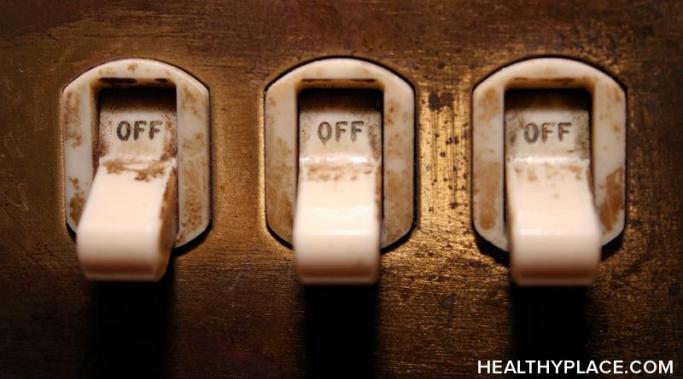Blogs
Having faced gambling addiction, the silent adversary that stealthily infiltrates lives and wreaks havoc on a person’s financial, mental, and emotional wellbeing, I am proud to be standing on the side of gambling addiction recovery because so many others don’t make it out. As I share my story of recovery and hope, I recognize how fortunate I am to be here and hope to help others stand on this side of gambling addiction recovery.
I have an eating disorder voice that needs to be turned off. I first began the work to heal from an eating disorder in 2010, and it's been a passion of mine ever since. But despite all those years of hard-fought experience in the eating disorder recovery trenches, I am still learning how to turn off the eating disorder voice in my head. This voice was a staunch, relentless companion for most of my adolescence. At times, I could not even separate my own inner voice from the eating disorder beliefs, anxieties, and compulsions always shouting at me.
You can learn how to support an employee with depression or bipolar. Employers play a big role in their employees' lives. Most people work 40-hour weeks and eight-hour days. This is a lot of time spent working, so it's important that those hours are supportive of each employee's wellbeing. I have had some bad experiences with prior workplaces and also some exceptional experiences. People with bipolar disorder or depression can be brilliant, hard-working, passionate employees, just like anyone else, and with a little extra help and accommodation, they can be very successful.
Have you tried to fix someone's mental illness? When we see others struggling with mental illness, we often get the urge to help. But for most of us, we aren’t equipped to treat their disease—and trying to can negatively impact our mental health. Sometimes we have to let go and accept that we can’t fix someone else’s mental illness.
Schizophrenia and routines are good partners. As someone with schizophrenia and generalized anxiety disorder (GAD), my mind can often feel chaotic. I might simultaneously experience olfactory hallucinations (smells), paranoia, and cycling thoughts about worst-case scenarios or other symptoms. These symptoms leave little space in my brain for health and wellbeing. That is why when I am at home, I follow a routine to add order and a sense of safety. Routines can give us a feeling that we have something we can count on when we have schizophrenia. They can also offer structure that can help with feeling out of control.
A friendship recession is a real thing. When was the last time you hung out with your friends? Or when have you had a real heart-to-heart conversation? If you cannot recall the date, you, like countless others, may have been hit by the friendship recession.
While I know it's tempting, don't try to be your own psychiatrist. Trying to be the psychiatrist is a mistake. Psychiatrists train for 10 years to decide how to help you. Do you have 10 years of training? These people treat others like you every single day and thus have years of clinical experience under their belt. Do you treat others and have years of clinical experience under your belt? For most of us, the answers are "no" and "no." When you try to be the psychiatrist, you hobble your own treatment. And the trust is, I see people doing it all the time.
I want to share what it's like to have borderline personality disorder (BPD) and experience severe emotional triggers in the middle of interactions. Borderline personality disorder triggers are no small thing.
I have battled grief in relation to my posttraumatic stress disorder (PTSD). I've spent years mourning the life I had before my trauma, as well as the life I feel I could have had if that traumatic event had never happened in the first place. Posttraumatic stress disorder has amplified my experience of grief.
According to Dr. Gabor Mate, underneath all addictive behaviors lies a deep, unresolved trauma wound.[1] One thing that helped me start releasing the shame I carry for struggling with addiction was learning about the two types of trauma: "big T" and "little t" trauma. Big T trauma is related to an acute, severe event like sexual assault or going to war. While little t trauma accumulates over time in response to things like active shooter drills or a childhood steeped in diet culture.[2] These two types of trauma are important to understand.










I'm sorry things are so hard. I know what that's like.
I can't tell you what to do, but I can tell you this: it took me a long time to find the best treatment for me -- and things still require tweaking. Moreover, it's unlikely that any one thing will work on its own for you. You likely need a combination of approaches like therapy and medication together. And remember, doing what you have always done will give you what you've always gotten. You can't change your brain on your own.
One thing I can say is, don't give up. Things can get better.
-- Natasha Tracy
I'm so sorry about how hard it is. I know what it's like to appear "fine" but be anything but. I also know how hard it is to ask for help.
I think when you're asking for support, the best thing to do is to think about what you want to say ahead of time and think, specifically, about how to explain what you're going through. You can then think about how to express yourself while not overly concerning the other person. (Keep in mind some concern is normal and unavoidable.)
For example, maybe you want to talk about being depressed. You might say something like, "I feel like everything is grey. Food tastes like sawdust. I feel like I'm never going to get better. I don't know what to do."
All those things are normal and okay. You might want to further express something like this, though, "I know my brain is lying to me about never getting better, but it feels very real."
The second part is important because it helps the other person put what you're saying into perspective.
Other people don't know what it's like to be in your brain, so try to explain it to them and explain how concerned they actually should be.
Finally, if you can't do the above, I understand. It's awful to have to take care of the other person while asking for help for yourself. That doesn't mean you still should ask, though. If they're concerned, then they're concerned, and that's okay.
-- Natasha Tracy
Thank you so much for reaching out to share this part of your story. From one twin to another, I am deeply sorry for the loss of your sister, and I can certainly understand the frustration, discomfort, and insecurities of feeling like your bodies were under constant scrutiny and comparison. I appreciate your vulnerability and willingness to share your insights and experience.
I now live a very depressed life, which is very isolating. I understand the feeling of not wanting to die, but also getting very worn out from living.
One day I want to seek help for myself, and the rest of the time I think it would be best to just soldier on alone.
I hate being such a disappointment to people, whether it's friends, family, or even the rare relationships I encounter.
I've tried medication in the past, I've tried counselling and support groups, I now think that nothing will help, especially not even my own ability to help myself.
If only you could just take whatever is wrong out of my head, as I really hate to think things are just going to get worse until life decides it's time for me to pass.
I appreciate your transparency and step by step ideas to survive as a single person.. Even though I suffer from Bipolar 1, I find that either end of the polar spectrum creates chaos in my life as well as friends and family. These are the more full blown manic times, where literally everyone who cares about me are dealing with hospitalization emergencies. While well , they assume everything is fine. Now is the deep depression where even leaving my house or getting out of bed are really hard. I am overwhelmed and my house is a mess. I do not communicate my depression to anyone but my therapist because I don’t want to make them worry. I’m worried myself because of the unpredictability of this disease.. I am too sad to cry and I’m practically having a panic attack thinking about going to work tomorrow. At any moment I could snap at one of my unlikable colleagues. Even though I need a paycheck, I’m also fully capable of quitting if anyone crosses me. The biggest frustration is that no one seems to understand. I appear normal on the outsides but inside, it can really suck. I’m going to listen to your podcasts and hopefully, you will cover more specifics on how to elicit support without causing panic…and who wants to be appointed this unpleasant job.